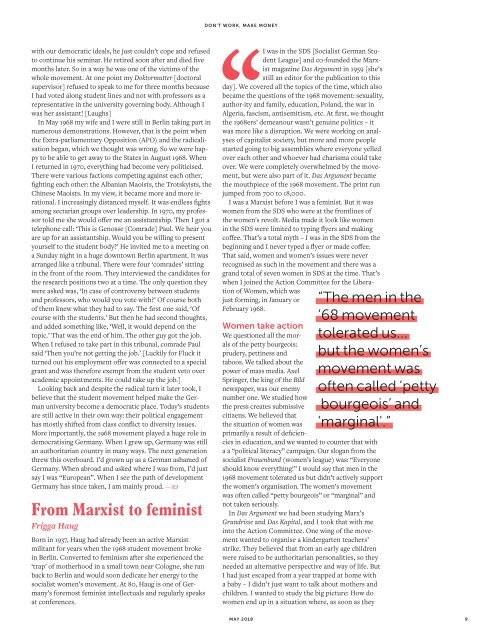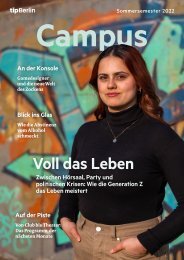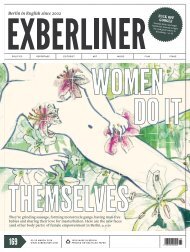You also want an ePaper? Increase the reach of your titles
YUMPU automatically turns print PDFs into web optimized ePapers that Google loves.
DON’T WORK, MAKE MONEY<br />
with our democratic ideals, he just couldn’t cope and refused<br />
to continue his seminar. He retired soon after and died five<br />
months later. So in a way he was one of the victims of the<br />
whole movement. At one point my Doktormutter [doctoral<br />
supervisor] refused to speak to me for three months because<br />
I had voted along student lines and not with professors as a<br />
representative in the university governing body. Although I<br />
was her assistant! [Laughs]<br />
In <strong>May</strong> 1968 my wife and I were still in Berlin taking part in<br />
numerous demonstrations. However, that is the point when<br />
the Extra-parliamentary Opposition (APO) and the radicalisation<br />
began, which we thought was wrong. So we were happy<br />
to be able to get away to the States in August 1968. When<br />
I returned in 1970, everything had become very politicised.<br />
There were various factions competing against each other,<br />
fighting each other: the Albanian Maoists, the Trotskyists, the<br />
Chinese Maoists. In my view, it became more and more irrational.<br />
I increasingly distanced myself. It was endless fights<br />
among sectarian groups over leadership. In 1970, my professor<br />
told me she would offer me an assistantship. Then I got a<br />
telephone call: ‘This is Genosse [Comrade] Paul. We hear you<br />
are up for an assistantship. Would you be willing to present<br />
yourself to the student body?’ He invited me to a meeting on<br />
a Sunday night in a huge downtown Berlin apartment. It was<br />
arranged like a tribunal. There were four ‘comrades’ sitting<br />
in the front of the room. They interviewed the candidates for<br />
the research positions two at a time. The only question they<br />
were asked was, ‘In case of controversy between students<br />
and professors, who would you vote with?’ Of course both<br />
of them knew what they had to say. The first one said, ‘Of<br />
course with the students.’ But then he had second thoughts,<br />
and added something like, ‘Well, it would depend on the<br />
topic.’ That was the end of him. The other guy got the job.<br />
When I refused to take part in this tribunal, comrade Paul<br />
said ‘Then you’re not getting the job.’ [Luckily for Fluck it<br />
turned out his employment offer was connected to a special<br />
grant and was therefore exempt from the student veto over<br />
academic appointments. He could take up the job.]<br />
Looking back and despite the radical turn it later took, I<br />
believe that the student movement helped make the German<br />
university become a democratic place. Today’s students<br />
are still active in their own way: their political engagement<br />
has mostly shifted from class conflict to diversity issues.<br />
More importantly, the 1968 movement played a huge role in<br />
democratising Germany. When I grew up, Germany was still<br />
an authoritarian country in many ways. The next generation<br />
threw this overboard. I’d grown up as a German ashamed of<br />
Germany. When abroad and asked where I was from, I’d just<br />
say I was “European”. When I see the path of development<br />
Germany has since taken, I am mainly proud. — EJ<br />
From Marxist to feminist<br />
Frigga Haug<br />
Born in 1937, Haug had already been an active Marxist<br />
militant for years when the 1968 student movement broke<br />
in Berlin. Converted to feminism after she experienced the<br />
‘trap’ of motherhood in a small town near Cologne, she ran<br />
back to Berlin and would soon dedicate her energy to the<br />
socialist women’s movement. At 80, Haug is one of Germany’s<br />
foremost feminist intellectuals and regularly speaks<br />
at conferences.<br />
I was in the SDS [Socialist German Student<br />
League] and co-founded the Marxist<br />
magazine Das Argument in 1959 [she’s<br />
still an editor for the publication to this<br />
day]. We covered all the topics of the time, which also<br />
became the questions of the 1968 movement: sexuality,<br />
author-ity and family, education, Poland, the war in<br />
Algeria, fascism, antisemitism, etc. At first, we thought<br />
the 1968ers’ demeanour wasn’t genuine politics – it<br />
was more like a disruption. We were working on analyses<br />
of capitalist society, but more and more people<br />
started going to big assemblies where everyone yelled<br />
over each other and whoever had charisma could take<br />
over. We were completely overwhelmed by the movement,<br />
but were also part of it. Das Argument became<br />
the mouthpiece of the 1968 movement. The print run<br />
jumped from 700 to 18,000.<br />
I was a Marxist before I was a feminist. But it was<br />
women from the SDS who were at the frontlines of<br />
the women's revolt. Media made it look like women<br />
in the SDS were limited to typing flyers and making<br />
coffee. That’s a total myth – I was in the SDS from the<br />
beginning and I never typed a flyer or made coffee.<br />
That said, women and women’s issues were never<br />
recognised as such in the movement and there was a<br />
grand total of seven women in SDS at the time. That’s<br />
when I joined the Action Committee for the Liberation<br />
of Women, which was<br />
just forming, in January or<br />
February 1968.<br />
“The men in the<br />
‘68 movement<br />
tolerated us...<br />
but the women’s<br />
movement was<br />
often called ‘petty<br />
bourgeois’ and<br />
'marginal'.”<br />
Women take action<br />
We questioned all the morals<br />
of the petty bourgeois:<br />
prudery, pettiness and<br />
taboos. We talked about the<br />
power of mass media. Axel<br />
Springer, the king of the Bild<br />
newspaper, was our enemy<br />
number one. We studied how<br />
the press creates submissive<br />
citizens. We believed that<br />
the situation of women was<br />
primarily a result of deficiencies<br />
in education, and we wanted to counter that with<br />
a a “political literacy” campaign. Our slogan from the<br />
socialist Frauenbund (women’s league) was: “Everyone<br />
should know everything!” I would say that men in the<br />
1968 movement tolerated us but didn’t actively support<br />
the women’s organisation. The women’s movement<br />
was often called “petty bourgeois” or “marginal” and<br />
not taken seriously.<br />
In Das Argument we had been studying Marx’s<br />
Grundrisse and Das Kapital, and I took that with me<br />
into the Action Committee. One wing of the movement<br />
wanted to organise a kindergarten teachers’<br />
strike. They believed that from an early age children<br />
were raised to be authoritarian personalities, so they<br />
needed an alternative perspective and way of life. But<br />
I had just escaped from a year trapped at home with<br />
a baby – I didn’t just want to talk about mothers and<br />
children. I wanted to study the big picture: How do<br />
women end up in a situation where, as soon as they<br />
MAY <strong>2018</strong><br />
9

















